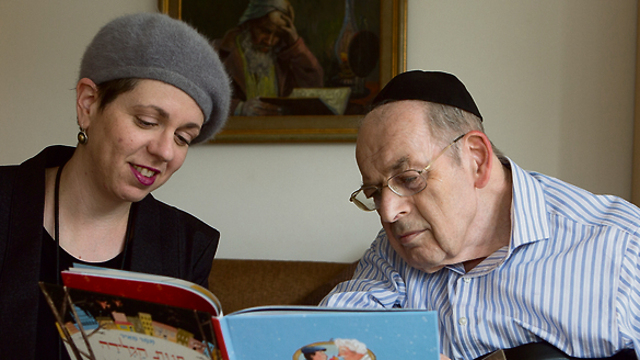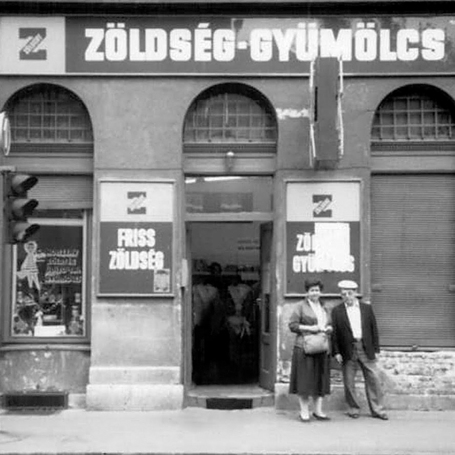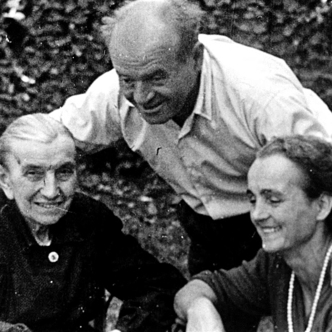
The ice cream parlor that saved our grandpa from the Nazis
When the Nazis invaded Hungary in 1944, Yitzhak Meir and his parents found shelter in Francesco Tirelli’s ice cream shop. Now, his unusual story has been turned into a children’s book by his daughter-in-law, Tamar Meir, in a bid to introduce the complicated issue of the Holocaust to young children.
Yitzhak, who was born in Budapest, shared the story of his survival with his children and grandchildren numerous times over the years. Now, the unusual tale has been turned into a children’s book by his daughter-in-law, Rabbanit Dr. Tamar Meir. The book, “Francesco Tirelli’s Ice Cream Store” (published in Hebrew by the Keter Publishing House with illustrations by Yael Albert) succeeds in sensibly dealing with one of the most complicated issues to present to children—the Holocaust.
“I always say that my imagination isn’t big enough to make up such a story, and even if it was, I wouldn’t have the courage,” says Meir. “But the connection between the Holocaust and ice cream is a rare opportunity to introduce such a complicated issue to children. For my kids, the fact that their grandfather was in an ice cream parlor during the Holocaust is appealing. It’s sort of like the fairytale of Hansel and Gretel. And just like with Hansel and Gretel, there is a witch in the story too.”
As soon as the book was published, it brought on responses. After she was contacted by the son of another survivors who had hid in the ice cream parlor as well, Meir decided to try to reach the offspring of all the people who had taken shelter there. She wrote an emotionally moving Facebook post in search of other survivors from the store.
“Just like the book is so meaningful to me and to my children, it may be a wonderful gift for them too,” she explains. “Some of the survivors have passed away, and not everyone shared what they had gone through during the Holocaust. I may be able to provide that information through the book.”
‘We didn’t think about ice cream’
I met with Yitzhak and Tamar Meir at Yitzhak’s apartment in Jerusalem’s Rehavia neighborhood. At the age of 90, he tells his story in a clear voice, with a slight Hungarian accent. There was one time during the interview when he broke into tears. It was when he pointed at a family picture in the living room, which features his grandchildren and great grandchildren. “All the people in that picture are here thanks to Francesco Tirelli, he said in a cracked voice. “He deserves all the credit for our survival of the horror.”
Toward the end of the war, in March 1944, the Nazis invaded Hungary and Yitzhak and his parents were in terrible danger. When the family searched for a place to hide in, Yitzhak heard the name Francesco Tirelli for the first time. Tirelli was born in Italy in 1898, but moved to Budapest, where he ran a small ice cream factory. When the war broke out, he began helping Jews who had escaped to Hungary and was known among the local community as a confidant.
Tirelli hid Jews in his ice cream parlor, which was closed during the winter. For about four months, Yitzhak and his parents hid with 10 other Jews at the back of the store. “We hardly had any food,” he recalls, “and we didn’t really think about ice cream. The greatest despair was that we didn’t know how long it would last.”
One day, they heard explosion sounds outside the shop. The Germans and the Hungarians were fighting on the street outside, and a grenade cracked the closed shutters. Through them, Yitzhak was able to peek and see the battle with his own eyes. Several days later, in the evening hours, someone suddenly broke into the store holding a candle. Through the dim light, Yitzhak and his parents saw a Russian soldier. was a sign that, for them, the war had ended.
The Meir family kept in touch with Tirelli. “But we never asked him why he had saved us,” Yitzhak says. “I think he would have been offended by such a question. As far as he was concerned, it was obvious that he had to do everything to help us.”
Tirelli passed away in 1956, in Switzerland. In 2008, thanks to Yitzhak’s efforts, he was recognized as a Righteous Among the Nations.
The story of Yitzhak’s rescue became a legend among the Meir family’s children. Several months ago, his daughter-in-law Tamar came up with an idea to turn it into a book.
“I realized there are many parents who don’t send their children to kindergarten and to school on Holocaust Day, because many teachers don’t know how to deal with the issue,” she says. “In my children’s case, we really don’t have that concern. And then I realized that Grandpa’s story is a sort of immunization for them. It’s not a grandfather in a concentration camp, but a grandfather in an ice cream parlor. And unlike the great horrors of the Holocaust, this is something a child can imagine. In addition, they know there is a happy ending, which is tangible—Grandpa is here, he is with us.”
This is the first book written by literary researcher Tamar Meir, an unusual figure in the Orthodox religious world, who defines herself as a “a religious feminism activist.” In addition to her position as director of the Literature Department at Givat Washington College, she studies Torah. “In recent years, I have been busy advancing the place of women in the world of Halacha,” she says. “We can’t take part in the discourse without having the knowledge.”
Have you encountered any resistance to your approach?
“Of course I have. In every situation in which you try to change something, there will always be resistance.”
This resistance was reflected in a lecture delivered by Rabbi Yigal Levinstein, head of the pre-army preparatory yeshiva in Eli, who told his students that girls’ service in the IDF resulted in a “disruption of their entire system of values.”
“We can and we must talk about the issue of girls in combat service. It’s not a simple issue, and I say that as a feminist,” Meir states. “But we have to talk about from a respectable place. He did it blatantly, in a disrespectful way, which is not rabbinical in my opinion. I expect a rabbi to speak in a respectable manner.”
(Translated and edited by Sandy Livak-Furmanski)













